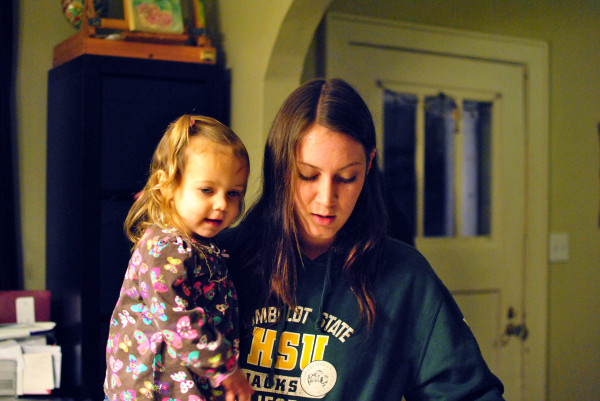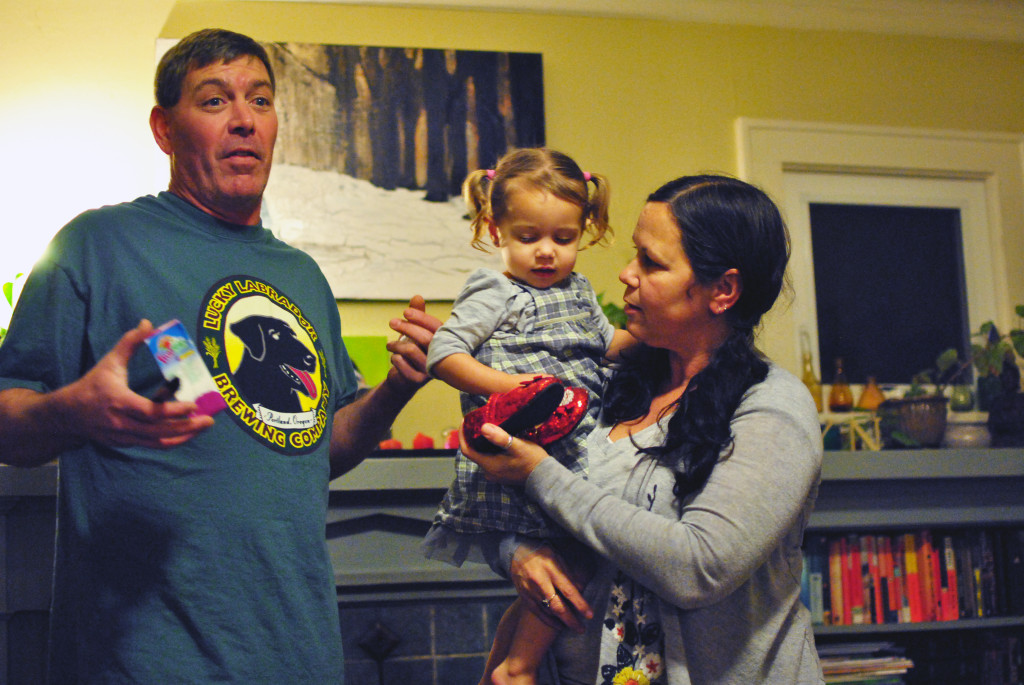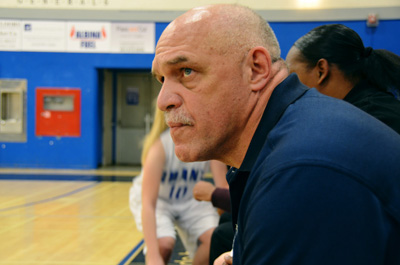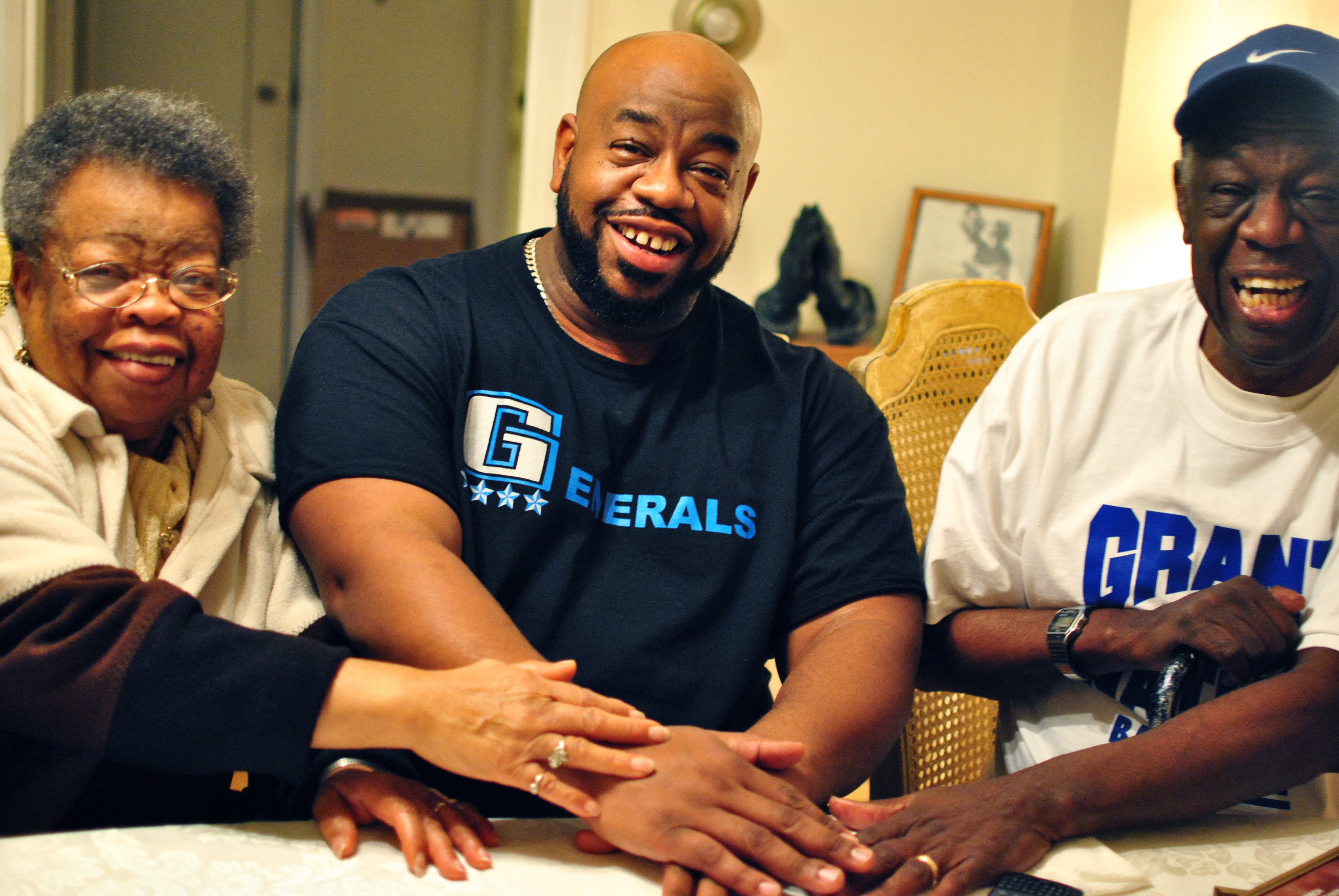
The screams came half a second after the thump. Two-year-old Kali Vogel was on the floor crying after falling off a chair. Grant senior Carlee Emerson swooped in and shuttled her niece into the kitchen where Nathan Emerson – known to the kids as G-Pa – was cooking enchiladas.
A few minutes later, with the help of her aunt’s kisses, the toddler was fine.
Kali Vogel and her five-year-old brother, Keagan, moved into the Emerson household in May last year. Their father, Alan Vogel, is Emerson’s stepbrother. He’s been on active duty with the U.S. Army since 2004.
He decided that an Army base or overseas is not a great place to raise kids, and his ex-wife isn’t involved. So nine months ago, the Vogel children were brought to Portland from their home near an Army base in Tennessee. They’ve been wreaking havoc inside the Emerson’s place ever since.
Toys are piled up in the corner of the living room when they aren’t scattered across the floor. Shouting, crying and a host of other kid-related noises create a melody that’s always on play in the house. For Emerson, it’s a blessing and a curse.
“Them being born made our whole family a lot closer. It’s definitely not a bad thing,” she says, noting that her senior year has had a few things added to it. Mostly, they revolve around the kids.
Emerson was born in 1995 in San Diego. Her father, Nathan Emerson, worked at a turbine factory. Her mom, Yvonne, was working as a graphic designer. Neither job brought in a lot of money.
“We didn’t live in a bad neighborhood, but we lived in a low income neighborhood,” her dad says.
The first elementary school Emerson went to was a little bit out of shape. “If half the people you know walked into that school, they’d be shocked,” she said.
Emerson and her step-brother were close as children, but they also had their share of conflict. Emerson describes Vogel as “the brother that would beat up on me all the time,” not unlike many older siblings. “But we were close,” she adds.
When she was in the third grade, Alan was a junior in high school. That’s the year he got kicked out of the house. “I was young,” he says now. “I was making a lot of bad decisions.”
His mother puts it a different way. “Alan was being an ass,” she says half jokingly. Vogel had been acting up since his mother married Nathan Emerson in 1992. He was into drugs and partying, and would often fight with his stepdad. Vogel didn’t do well academically, and he wasn’t motivated to go to college. He decided that the Army would be best for him. It wasn’t.
He turned 19 in Iraq during his first tour overseas, and has since deployed again to Iraq, to Afghanistan twice, and once to Korea. As a G.I. in the 101st Airborne, the division of the Army with the highest fatality rate, Vogel is no stranger to combat.
In one firefight during his second tour in Afghanistan, a soldier under Vogel’s charge was shot and killed while strapped to Vogel’s back. That soldier’s metal bracelet now permanently adorns Vogel’s wrist. “Every time he goes to the airport, he refuses to take it off and they have to search everything he has,” says Carlee Emerson.
Vogel had many other traumatic experiences during his service, including being hit by a roadside bomb and taking shrapnel to one of his legs. “It wears on you, physically and mentally,” says Vogel, “I feel like I’m 60.”
It didn’t take long for the trauma to catch up to him. Vogel often dreamt that his younger sister was the one dying by his side. “That’s when we knew he had PTSD,” says Carlee Emerson. “But he wasn’t diagnosed until a few months ago.”
Post Traumatic Stress Disorder is an anxiety disorder caused by exposure to traumatic events. Characterized by flashbacks, nightmares and panic attacks, the condition can seriously impair the subject from functioning well in everyday life. Some are affected more than others, and genetics are thought to be a factor in the severity of the disorder. It varies from person to person.
For Vogel, PTSD wasn’t the only thing that came out of combat. “It kind of forced him to grow up,” says Emerson. “You can’t act like a kid and take what happens over there.”
Two and a half years after his enlistment, Vogel got married. His first child, Keagan, was born in November 2007. He watched the birth on Skype from Baghdadin, Iraq. Kali arrived on Halloween in 2010.

Vogel and his then-wife didn’t see eye to eye on raising the children, he says, because neighbors of their Tennessee home would sometimes call Vogel to let him know about the partying going on at his house. Vogel felt helpless. He couldn’t do much from 6,700 miles away. He brought the kids to Portland last April so they could have some kind of stability in their lives. Their mom is now out of the picture for the most part.
Today, Vogel uses Skype to visit with his children almost every night from the Army base in Honolulu where he is stationed until February 2013. Sometimes they talk. Sometimes Vogel just watches from the computer screen and his little ones show off their everyday activities, like running around and yelling.
The Army hasn’t been very flexible with where he is stationed, so even when Vogel isn’t deployed it’s hard to be close to his family. “He’s been trying to get out of the military so he can be with his kids,” says Emerson.
But it’s been tough. The Army isn’t very lenient about it, and Vogel’s superiors have been stubborn. “I can’t listen to him talk about his commanding officer without cussing like every two words,” says Emerson.
Until he does get out, his kids will be living at the Emersons’, and they’ve managed to conquer every room in the place. Carlee Emerson’s room has been cut in half. On one side, her own bed and dresser are crammed into the corner. On the other, a twin size mattress sits against a wall that’s painted dark blue with glow-in-the-dark stars. Paper fish and “monsters” hang from the ceiling on the kids’ side, and on her side there’s a shelf overflowing with a rainbow of nail polish.
There’s one considerable “plus” to having the kids in her room, though: she doesn’t need an alarm clock.
Keagan and Kali are still on East Coast time, according to their grandpa. They wake up at 6:40 a.m. every day, and the second the older one is up, he’s fully charged. He often shouts up the stairs to his grandparents, successfully waking everyone in the house. He also wants a trumpet, supposedly to be more efficient in his morning routine.
Dinner is served with juice boxes on most nights, and meals now remind Emerson of her own childhood. Mac n’ Cheese and chicken nuggets are back on the menu. Emerson is often the one cooking.
Kali is a future chef herself. She shrieks with delight as she pours plastic food onto the floor from a miniature teapot, stationed at her personal pink toy kitchen.
Meanwhile, “G-Pa” gives her older brother a lesson on respecting personal space, struggling to break the five-year-old’s stubborn spirit. Emerson joins the fight by ordering her nephew to “get a puzzle,” so that he has something to do. The response: “No.”
Emerson’s father tries again, telling Keagan, “Go play with your rocket.” Still, the answer is “No.” The stand-off degrades to a battle of wills and the young boy ends up in solitary confinement in his room.
He continues fighting from there as Emerson tries to talk about her own plans for the future. “No,” he keeps yelling half heartedly, his voice trailing off into silence.
Emerson wants to play softball in college, something she’s been involved in since age five. She’s in a highly competitive league today, and often travels to California and other states to play. But Emerson is also into art, and she says there are only two art schools – one in San Francisco and another on the East Coast – that offer legitimate softball programs.
Her two passions are at odds, but she thinks softball will win out. “I’m not some serious art kid, because that’s a little overrated,” she says. But she enjoys making art in her free time.
Instead of partying every weekend, Emerson’s senior year has been full of punching straws into Capri Suns and laughing with young kids. “I can’t really go out on weekends anymore,” she says. “Well, I can. But I do a lot less.”
As she explains this, the “no’s” continue to interrupt from the bedroom.
Both children are constantly looking for attention, presumably because they didn’t get much time with their mom back in Tennessee and their father was deployed for most of their lives. But when he comes home, the family hopes to gain some stability.
“I don’t know if he’s going to know how to take care of his kids, to be honest,” says Emerson. “But I think it will be good for him…to live a normal life and not have the everyday stress. He’s excited to be a dad again.”
Although he’s looking forward to being a part of Keagan and Kali’s life again, Vogel needs time for things to get back to normal. The Emersons are in the process of renovating their basement so that Vogel and the kids can have their own space. “I’m making a new house downstairs. It’s made of walls,” Keagan shouts. “Daddy’s gonna come!”
The five year old jumps around his grandparents’ living room sporting a gold cape and a shirt that says “Super strong like my Dad.”




